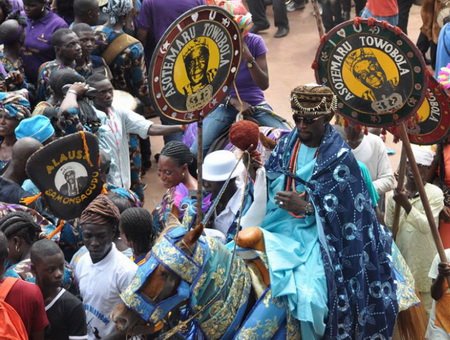By Dr. Luke Onyekakeyah
The outrage following Peter Obi’s lamentation over the sudden demolition of his brother’s property in Ikeja, Lagos is instructive and underscores the woes of Igbo migratory adventurism.
Although, the Lagos State Government has flatly denied any involvement in the illegal demolition, it is incumbent on the state government to say who else has the power and capacity to go about in the city demolishing people’s properties with impunity, otherwise, the development may be viewed as part of the persecution by the state authorities targeted against Igbo interests in Lagos, in an effort to edge them out of the state.
According to Peter Obi, the 2023 presidential candidate of the Labour Party (LP), he had rushed from Abuja to Lagos after receiving a distress call from his brother. Upon arrival at the property site, he was blocked by security men who claimed to havea court order but refused to show validdocuments.
Obi’s account has resonated widely across the country, sparking public outrage and drawingcondemnation from civil society groups concerned with the rule of law, due process and the protection of property rights. The investigation authorized by the Lagos State Government should say who was responsible for the demolition if the government was not involved.
Recent happenings show that there will be no end to the demolition of Igbo properties in Lagos, not until there is a mass exodus of Igbo back to the homeland, as the Jews fled from Arab lands in 1948, would the persecution stop. All Igbo properties in Lagos constitute a historic anomaly.
Adventurism in the context used here refers to the tendency of the Igbo to migrate to other lands and consciously decide to settle, build homes and develop those lands while their homeland is abandoned in a pathetic and undeveloped state.
Some assume traditional titles and begin to command influence in the Diaspora. The Igbo proclivity is different from what obtains with other migratory peoples around the world. There is nothing wrong with migrating to other lands but there is everything wrong with abandoning the homeland, which is senseless.
Normally, people migrate far and wide to other lands, acquire wealth and repatriate the wealth to develop their homeland. The British, Indians, Chinese and Japanese are typical examples. The Igbo deviation from the grand norm of global migration has created a strange culture that raises fundamental questions about the Igbo.
It is often said that east or west, home is the best. What manner of people are these that feel more comfortable outside their homeland? If all the Igbo investments outside home were done in Igbo land, the region would be like Japan. My aim here is not to discourage migration but to encourage repatriation of wealth to the homeland as is done by other migratory peoples around the world.
From time immemorial, people migrate to other lands in search of the Golden Fleece. The goodies, after they are acquired, are repatriated back home and used to develop the homeland. That way, the adventurous migrants leverage their societies. Historically, migrant populations have often been antagonised by their host communities, especially, when they become more prosperous than their host.
The Bible records that the children of Israel migrated to Egypt and lived there from around 2000 BC. Biblical accounts indicate that the Israelites multiplied and became prosperous and powerful to the extent that the Egyptians saw them as a threat. In order to curtail their rising dominance, drastic measures were introduced, including instruction from Pharaoh, the King, to midwives to kill at birth any male child born to a Hebrew woman. The aim was to reduce their population.
History has it that the new Egyptian rulers embarked on major construction projects to garrison their borders in order to prevent foreigners from entry. The building projects involved heavy taxation of the people. Expectedly, the heaviest taxes and labour fell on the foreigners, the Israelites, living in Egypt. The building projects formed the substance of the oppression of the Hebrews, which led to their outcry and anguish and eventual deliverance out of Egypt. They left behind all that they built over the decades of sojourning in a foreign land.
There are other examples of migrants who prospered in foreign lands but were later antagonised and subjected to untold persecution aimed at curtailing their growth and domination. The slaughter of six million Jews by the Nazi regime under Hitler stemmed from the fact that the Jews were prosperous and dominating almost in every field of human endeavour.
The Igbo, who inhabit southeastern Nigeria, east of the River Niger, are undoubtedly, the most migratory ethnic group in Nigeria. They are very industrious. From time immemorial, they have been in the vanguard of migration and trading. This identity, coupled with land scarcity, amidst high population density, propelled them to always look outside their homeland for what to do. That is the root of Igbo adventurism. But that is not the problem. The problem is the penchant to settle in other lands while forgetting their homeland.
When the European slave merchants came to West Africa, arguably, the Igbo were very much in the fore-front of the booming business. Prominent Igbo chiefs, who served as slave dealers prospered in those days. The people sold were mainly societal delinquents. Something as mundane as a child stealing one piece of meat from the soup pot would earn him being sold into slavery. Stubborn children were automatically good articles of trade.
Whereas the slave trade was not concentrated in Igbo land alone, somehow, the Europeans learnt that Igbo slaves were very strong and hardworking and, and therefore, were in high demand in the plantations in the Americas. That explains why there is a high concentration of African Americans and Afro Caribbean of Igbo descent.
Unlike the Igbo, the migration style of the British, Indians, Chinese and Japanese, among others, conform to the ideal migration norm. The British and the Japanese, in particular, have certain things in common. For example, both countries are islands, surrounded by water, with little or no resources. The two peoples are adventurous. They ventured into other lands in search of resources and wealth to build their countries.
Since their homeland cannot support them, they have to explore other lands to look for resources to bring home. Thus, while the British were combing the western hemisphere, the Japanese were combing the eastern hemisphere in aggressive confrontation, domination and exploitation of resources in those lands. The imprints of the British are manifest in Africa, among others, while Japan dominated the Koreans and Chinese, among others. Whatever they acquired from the conquered territories were repatriated home to develop their homeland.
Against this backdrop, it presents a subject of serious academic study as to why the Igbo are different from the rest of migratory peoples around the world. Why do the Igbo acquire wealth in foreign lands, rather than repatriate it, they settle comfortably there with the wealth, while leaving Igbo land in decrepit condition. Why have the Igbo not learnt any lesson from the experience of the Nigerian civil war, which robbed them of the properties they acquired in different parts of Nigeria? What are the governors, Igbo leaders of thought, Igbo think tank doing about this important existential issue?
For instance, reports say about 70 per cent of the properties in Abuja FCT belong to the Igbo. The same percentage of buildings is in Lagos and other cities across the country. Some prominent Igbo people have sarcastically stated that “Lagos is a no-man’s land,” mimicking what the former Lagos State governor, Lateef Jakande said during his inauguration as governor in 1979, which is totally wrong. There is no time in Nigeria that Lagos would be counted as no man’s land or belonging to the Igbo even if they own all the properties in the state. Geographically, Lagos is situated in Yoruba land. There is no contention about that.
It is high time that the Igbo used their tongue to count their teeth. They should retrace their steps, think strategically and stop mocking themselves. Unfortunately, many property owners don’t even know that the Certificate of Occupancy (C of O) issued by the government anywhere expires after ninety-nine years and has to be renewed, otherwise, it turns to the government that issued it! It is time the Igbo retraced their steps and look homeward. Land scarcity should not be a problem. The Japanese face the same problem, which is why they decided to embark on building skyscrapers thereby expanding vertically.
Follow us on all social media platforms @dailyquery for news and analyses around the globe



























